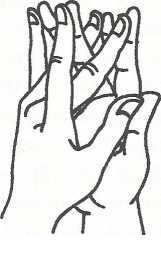Talk:Dhenumudra
From Hindupedia, the Hindu Encyclopedia
dhenumudrā (‘hand-pose [resembling the udder of] a cow’) Mudrās are poses of fingers or hands exhibited in ritualistic acts, especially during the worship of a deity. They are so called because they are supposed to give (= rā) joy (= mud) to the deities who are being worshipped.
The dhenumudrā is a pose of the fingers of both the hands, in the form of the udder of a cow, and is used during the offering of food to the deity. It is formed by crossing the fingers of the two hands in such a way that the tip of the little finger of one hand touches the tip of the ring finger of the other, and, the tip of forefinger of one hand with that of the middle finger of the other. This mudrā is also called ‘amṛtī- kar aṇamudrā’. See also MUDRĀS.

